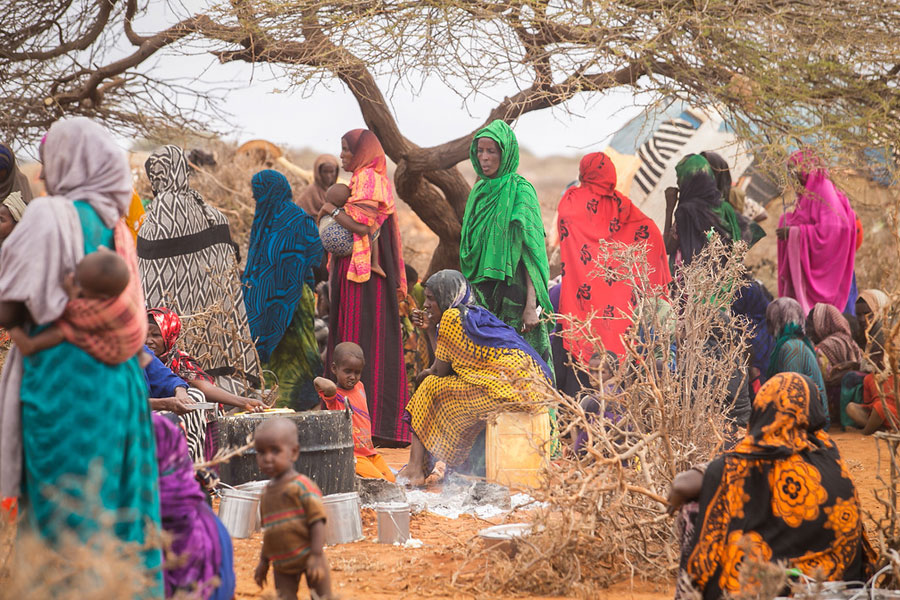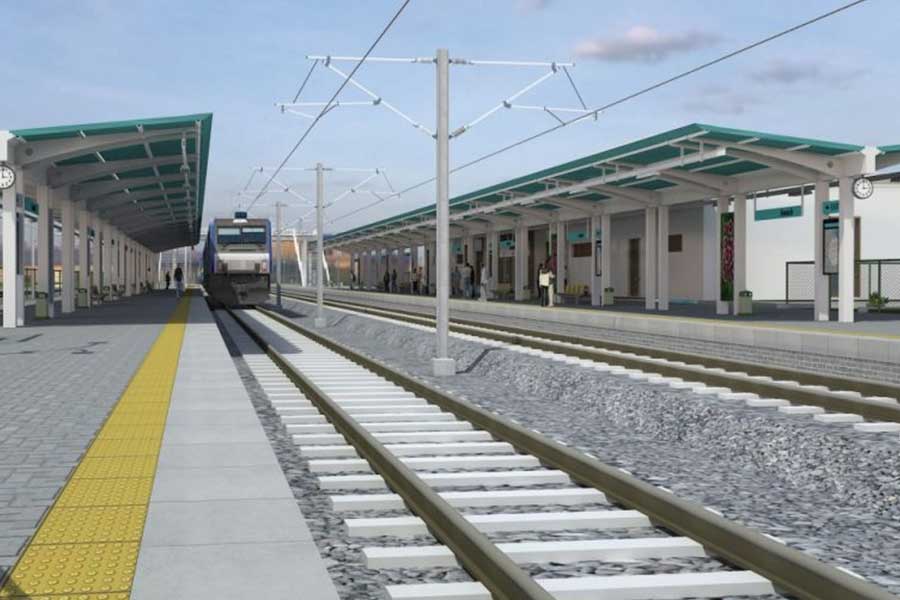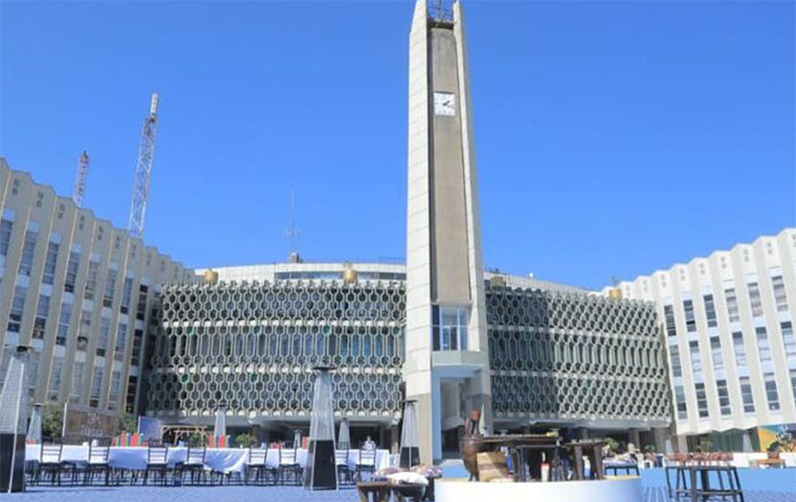
Fifteen-year-old Bitania Zerihun hoped to join Black Lion Secondary School for high school studies when she completed her elementary class at Frehiwot Primary School. Bitania's wish came true, and she joined the secondary school last year.
"I applied at Black Lion, because I heard that the quality of education is good," said Bitania, who lives in Lideta District and ranks first in her class.
She loves the school’s education, and she has grown quite fond of the new friends she has met at the school and her teachers.
However, she does not feel comfortable with the deteriorated infrastructure of her school. She says that her classroom walls are cracked, the desks are worn out, and the windows are in ill-repair and some are broken. The school's toilet is also in a terrible state, according to Bitania.
Dawit Gubaw, a history teacher at the school shares Bitania's sentiment.
"Though the school has a rich and prominent history, it has been neglected by the administration," said Dawit.
Black Lion is one of the public schools in the city that opened in 1980 on confiscated land the Derguetook from the nearby school, Lycée Guébré-Mariam.
The school, named after the anti-fascist resistance movement during the Italian occupation of Ethiopia, has 1,259 students enrolled in 29 sections in grades nine and 10.
July 9, 2019, it was a special day at school for Bitania and Dawit, who have been thinking about how to renovate and improve their school. On that day Deputy Mayor Takele Uma and Amir Aman (MD), minister of Health, were at Black Lion to launch the renovation work of the school and its nearby namesake, Black Lion Hospital.
The school and the hospital are part of the City Administration's plan to renovate and maintain 488 public schools and 10 hospitals this summer. The renovation of the schools is expected to be completed before the coming educational year.
Replacement of desks, fixing blackboards, restoration of damaged areas, and construction of new toilets are among the renovations planned for the educational centres.
The programme aims to bolster the capital’s 488 public schools in terms of their infrastructure, as well as the quality of education.
The program aims to bolster the capital’s public schools in terms of their infrastructure as well as the quality of education, according to Bereket Takele, press and social media director at the Mayor’s Office.
"Public education has seen the bare minimum support for a long time and has been a complaint of the city’s residents," said Bereket.
An academic paper published in 2017 supports Bereket's assertion.
Titled “Public Schools & Private Schools in Ethiopia: Partners in National Development?” the study states that private schools provide more learning achievement than public schools.
Students in private schools score more than students in public schools in national examinations, according to the paper.
"Classrooms were less crowded, and teachers were more qualified in private schools as compared to public schools," reads the research.
This seems to be recognised by the City Administration with the recent moves of renovating the schools and equipping them with the necessary material.
Civil work and painting are designed to be executed by youth enterprises organised under the City Administration. The toilets will be built by Splash, a nongovernmental organisation committed to water and hygiene work in the capital.
Addis Melaku & His Friends’ Cooperative is one youth enterprise that won the bid to work on the civil work at Black Lion Secondary School.
"We were awarded the project after winning a tender 15 days ago," said Addis Melaku, general manager of the Enterprise.
Splash provides clean water, health and hygiene education and service. It has already been working in the sector for a while, implementing its programme in 70 schools, orphanages, shelters and hospitals.
The agreement it reached with the City Administration enables it to scale up the programme to all the public schools in the city, according to Dawit Alemishet, Splash Ethiopia's country director.
In addition to building sanitation, Splash will also work on bringing behavioural change and hygiene education to the schools, according to Dawit.
The cost of bringing splash hygiene products to schools is around 16 million dollars, and the City Administration will cover 50pc of it, while Splash's donors cover the balance. Splash is set to complete the project in 2022, according to the agreement. Along with the renovation work, the City Administration also plans to provide all 600,000 public students with uniforms.
Since the City Administration finds the making of uniforms specific to each school very difficult, it resorted to making a common uniform but differentiating them with a badge. All the capital’s public school students will have the same uniform grouped into categories of kindergarten, between grade one and four, from grade four to eight and from grade nine to twelve. The uniforms will have badges that identify which school the students attend.
Currently, the City Administration is in the process of selecting the design and negotiation with garment companies to make the uniforms, according to Bereket. It also targets to provide 7.5 million notebooks needed by the 600,000 students for the next academic year. So far, it has managed to collect 4.5 million notebooks.
The City Administration, which will be covering the cost of all of the projects but hopes to partner with development organisations, also plans to set up two boarding schools in the capital - each separately dedicated to female and male students. Yekatit 12 Preparatory School, which will be dedicated to girls, will also revert its name to its former name of Etege Menen Boarding School. Ethio Japan Preparatory School, which is located in Aqaqi Qality District, will be dedicated to boys.
Expected to be operational in the next academic year, the two boarding schools will enroll new students after transferring current students already enrolled at the schools to other high schools depending on their choice.
"We want the boarding schools to be centres of excellence that will be attended by the best students of the city," said Bereket.
In the implementation of the programmes, the Mayor’s Office is working with the City's Education, Health and Construction bureaus. It also plans to lure one million volunteers who will contribute their efforts in achieving the set goals.
Twenty-nine-year-old Bethlehem Wendimu is one of the volunteers who is taking part in the campaign.
She has been volunteering for the past four years and finds the task proposed by the city as noble.
"I'm ready to commit my time and knowledge to the city," she said.
The public schools also require more profound renovations than physical ones, according to Tirusew Tefera (Prof.), a lecturer at Addis Abeba University's College of Education & Behavioural Studies for four decades.
"Upgrading school facilities such as its library, ICT and laboratories in addition to improving the competency of teachers and parental involvement in public schools are equally essential," said Tirusew.
Tirusew argues that improving school culture can bring the desired result, and he recommends the City Administration to work on extra curriculum activities.
"Schools have to be inclusive, capitalise on the potential of their surrounding community and be a place where students can hang outside classes," Tirusew told Fortune.
Berhanu Moreda, director of overall education sector education development at the Ministry of Education, says that this renovation campaign is part of the bigger one that is planned to be launched at a national level.
“The problems of the country’s public schools have been long known,” said Berhanu. ”Though the renovation was launched as a new campaign, it has been in the pipeline for awhile.”
Other regional states are also implementing the programme, according to Berhanu. There are a total of 918,207 students in 2,711 schools in the capital. While at the national level there are around 9,000 schools.
For Bitania, the current talk of change was enough to capture her interest and curiosity. But this ninth-grader has her expectation and reservations. She hopes to see her plasma-screen TV fixed as well as the playground to be improved. She also does not see the reason why her uniform has to be changed.
"It seems unnecessary as there was nothing wrong with our uniforms," Bitania told Fortune.
But whatever the case, Bitania remains excited to see the changes in the next academic year.
PUBLISHED ON
Jul 13,2019 [ VOL
20 , NO
1002]

Fortune News | Oct 14,2023

Sponsored Contents | Mar 28,2022

Fortune News | May 14,2022

Fortune News | Mar 06,2021

Radar | Apr 06,2019

Radar | Apr 21,2024

Radar | Mar 20,2021

Fortune News | May 23,2020

Fortune News | Jul 09,2022

Radar | Aug 03,2019

Dec 22 , 2024 . By TIZITA SHEWAFERAW
Charged with transforming colossal state-owned enterprises into modern and competitiv...

Aug 18 , 2024 . By AKSAH ITALO
Although predictable Yonas Zerihun's job in the ride-hailing service is not immune to...

Jul 28 , 2024 . By TIZITA SHEWAFERAW
Unhabitual, perhaps too many, Samuel Gebreyohannes, 38, used to occasionally enjoy a couple of beers at breakfast. However, he recently swit...

Jul 13 , 2024 . By AKSAH ITALO
Investors who rely on tractors, trucks, and field vehicles for commuting, transporting commodities, and f...

Jun 28 , 2025
Meseret Damtie, the assertive auditor general, has never been shy about naming names...

Jun 21 , 2025
A well-worn adage says, “Budget is not destiny, but it is direction.” Examining t...

Jun 14 , 2025
Yet again, the Horn of Africa is bracing for trouble. A region already frayed by wars...

Jun 7 , 2025
Few promises shine brighter in Addis Abeba than the pledge of a roof for every family...